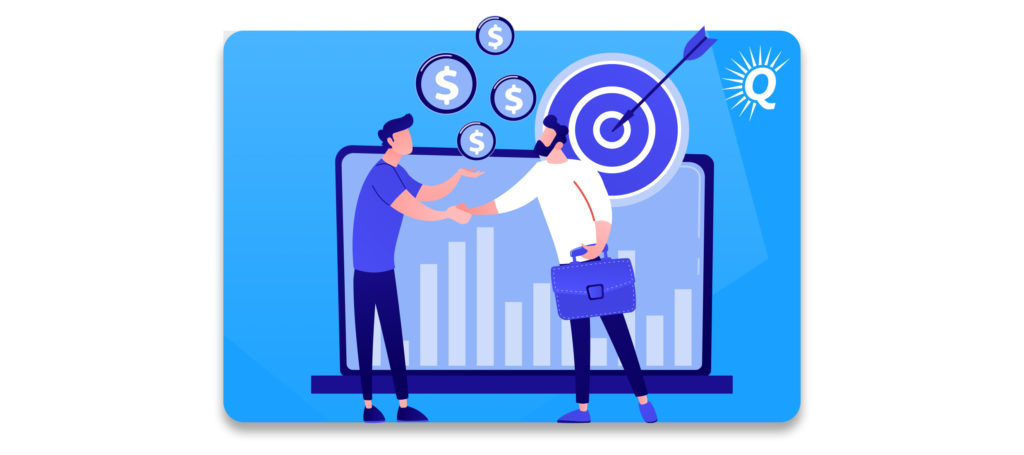Topics:
Never Miss a Beat - Get Updates Direct to Your Inbox
FILTER:


Discretionary Cash Flow: A Business Owner’s Guide to Tracking
By Ian Drogin


Discretionary cash flow is one of the most important numbers to track in any any online business. Without knowing how much money you’re making (or losing), it’s impossible to understand what’s fully going on within your business.
Despite the importance of tracking discretionary cash flow, a lot of entrepreneurs fail to pay it the close attention it needs every month. Such neglect often results in poor financial management, missed opportunities, and reduced earnings.
This article will discuss the importance of understanding, tracking, and managing discretionary cash flow in your online business.
Buy a Profitable Online Business
Outsmart the startup game and check out our listings. You can request a summary on any business without any further obligation.
What is Discretionary Cash Flow?
Let’s start with the basic question: what is discretionary cash flow?
Discretionary cash flow is the amount of pre-tax money earned by your business before accounting for each non-cash expense, discretionary expenses, one-time revenues and expenses, and any interest expense.
The key word in the term is discretionary, which, according to Merriam-Webster, means “left to individual choice or judgment”.
“Without knowing your operating cash flow, it’s easy to overlook how much you’re spending to support your lifestyle.”
Discretionary cash flow can be confusing because it actually does not include expenses that are incurred at the owner’s discretion. Rather, it only accounts for expenses that are absolutely necessary for the business to function, as well as revenues earned through the business’s primary activities.
For example, if you decide to go to Costa Rica for three weeks to drink margaritas on the beach while running your business, your travel expenses are not counted when calculating discretionary cash flow. Unless you’re in a very unique situation, you probably could run your online business just fine without going on a vacation.


In addition to lifestyle expenses, discretionary expenses also include one-time purchases that aren’t likely to be repeated in the future. For example, a one-time investment to build a website to start a business would generally be categorized as discretionary spending.
It’s important to note that discretionary cash flow is generally calculated by adding all discretionary expenses to your net income statement. For this reason, the expenses that are added back to your income are known as add-backs.
Discretionary cash flow is also referred to as Total Owner’s Benefit, Seller’s Discretionary Earnings (SDE), Seller’s Discretionary Cash Flow, Adjusted Cash Flow, and Recast Earnings.


The Importance of Tracking Discretionary Cash Flow
Discretionary cash flow is important because it tells you how much your business is actually earning before any “non-essential” (discretionary) expenses are incurred.
Without knowing your operating cash flow, it’s easy to overlook how much you’re spending to support your lifestyle. This can easily lead to spending more money to cover your personal expenses than is financially healthy for your business. After all, each dollar you spend vacationing in Costa Rica is one less dollar you have to invest in your business.


For many entrepreneurs, gaining insight into their discretionary cash flow reveals how much money they’re spending on activities that don’t contribute to growth. If the number represents a significant portion of your total earnings, it might be worth cutting back on discretionary expenses.
Can Discretionary Cash Flow Impact Business Valuation?
To a large extent, your business’s discretionary cash flow determines its value.
Generally, the value of your business is calculated by multiplying your annual discretionary cash flow by a number known as “the multiple.” This article goes into more detail about business valuation, but just knowing that discretionary cash flow is one of the two primary numbers involved in the valuation process reflects how important it is.
3 Key Benefits of Tracking Discretionary Cash Flow
Tracking your discretionary cash month-to-month reveals the true nature and trajectory of your business.
Some of the key insights revealed by your discretionary cash flow include:
- Growth trends
- Spending inefficiencies
- Business value


Understanding Growth Trends
When you track your seller’s discretionary earnings each month, you’re able to observe the growth or decline of your business.
It’s obvious, but positive growth is one of the primary goals for any business owner. Since discretionary cash flow doesn’t take into account discretionary expenses, it can often provide you with a more accurate gauge of your business’s performance than can your net profit.
“When you track your seller’s discretionary earnings each month, you’re able to observe the growth or decline of your business.”
For example, let’s say that in May you decided to renovate your home office and go on an expensive 10-day retreat, all of which is expensed to the business. Since these expenses are included in your net income, that statement will likely show a significant decrease in your earnings for the month.


On the other hand, your seller’s discretionary earnings would not be affected by these expenses since they would be regarded as discretionary.
By parsing out discretionary expenses you’re able to see the true growth trends within your business. In other words, you can still take that trip to Bali without it decreasing the value of your business.
Identifying Spending Inefficiencies
When you compare your net income to your discretionary cash flow, it becomes easy to identify spending inefficiencies.
For example, if your monthly net income is $20,000 but your discretionary income is $10,000, it means that you’re spending $10,000 on expenses that aren’t directly related to the growth of your business.
“When you compare your net income to your discretionary cash flow, it becomes easy to identify spending inefficiencies.”
In such a situation, it might be wise to ask yourself, “what personal expenses could I eliminate to free up working capital for high-leverage growth activities?”


If you run an ecommerce business, perhaps you could use the extra money for a capital expenditure to launch new product lines. If you have a content site, maybe you can hire more content creators and expand to new verticals. In general, it’s always a good idea to reduce wasteful spending and invest in the activities that drive the growth of your business.
There’s always an opportunity cost when using your business income to support your personal lifestyle. There’s nothing wrong with paying yourself an owner’s salary and letting your business cover your vacations, but it’s important to keep it in moderation and set a business budget that allows you to meet your goals.
“It’s always a good idea to reduce wasteful spending and invest in the activities that drive the growth of your business.”
Tracking the Value of Your Business
Since discretionary cash flow is one of the two primary elements in most valuation formulas, tracking it can allow you to keep an eye on the value of your business.
Tracking discretionary cash flow for valuation purposes is especially important if you have a specific exit goal. At any given time, you can simply multiply your expected multiple by your SDE to get a relative idea of your business’s value.


What are the Best Uses for Discretionary Cash Flow?
Since you have complete control over how you use your discretionary cash flow, you can invest it in whatever way you choose.
Larger companies often use discretionary cash flow to provide bonuses for employees, pay cash dividends to investors, pay down debt, or buy back common stock. For owners of privately held online businesses, many of these uses don’t apply.
One of the many perks of being a sole owner of an online business is that you get to determine your owner’s compensation (aka owner benefit or owner salary). Most digital entrepreneurs choose to use their discretionary cash flow to fund either other investments or lifestyle expenses.
Using Discretionary Cash Flow to Fund Other Investments
Many smart owners choose to invest a portion of their discretionary cash flow into other opportunities. The amount invested is subjective and based on the owner’s goals, other income, and skillset.
In many ways, investing discretionary cash flow is no different than investing the salary you would earn from a traditional job; all of the same avenues are available to you. You can invest in stocks, bonds, real estate, or other businesses.
Since most digital entrepreneurs are familiar with specific business models, it’s not unusual for them to acquire other businesses that they can continue growing.
Using Discretionary Cash Flow to Fund Lifestyle Expenses
Even though spending money on living and lifestyle expenses won’t directly help you grow your business, it’s one of the great benefits of owning your own online business. For entrepreneurs who started a business in order to quit their day job, being able to have your business fund your personal expenses is a dream come true.
While having a business that can cover your living costs is certainly something to celebrate, it’s important to maintain perspective as you navigate the many financial decisions you face as a successful entrepreneur.
“Each dollar taken from the business is one less dollar available for growth activities.”


Sometimes, first-time business owners have a tendency to dramatically increase their personal expenditures as their business grows. That may work in the short run, but it will hinder your ability to experience rapid growth in the long term. Each dollar taken from the business is one less dollar available for growth activities.
Often, it’s a wise idea to work with a business broker or investment advisor who can help you save cash flow and invest it where it most matters.
How to Calculate Discretionary Cash Flow
Just as many people are unclear between gross versus net income, a lot of business owners get lost when trying to calculate their discretionary cash flow.
There are a few steps to determine discretionary cash flow.
Establish Pre-Tax Earnings
To calculate your discretionary cash flow, you first need to establish your business’s pre-tax earnings.
“Consistently tracking your discretionary cash flow allows you to maintain perspective on your business as it continues to grow, as well as make sound financial decisions along the way.”
Add Non-Operating Expenses
Once your pre income tax earnings are determined, you must add back all non-operating expenses (those not required for the core operations of the business).


Subtract Non-Operating Income
Then, you need to subtract non-operating income, which is any income earned through non-typical activities of the business. In other words, income that isn’t regular or predictable.
Add Non-Recurring Expenses
Next, you should add non-recurring expenses, such as one-time upgrades that will not take place again in the future.
Add Depreciation and Amortization Expenses
Lastly, you must add depreciation and amortization expenses.
Once you’ve performed these calculations, you’ll have arrived at your discretionary cash flow. When trying to sell your asset to a business buyer, this number is also known as the seller’s discretionary earnings or owner’s discretionary cash flow.
Conclusion
Consistently tracking your discretionary cash flow allows you to maintain perspective on your business as it continues to grow, as well as make sound financial decisions along the way. Whatever stage your business is at, it will be well served by your attention to your monthly cash flow.
Thinking of Selling Your Business?
Get a free, individually-tailored valuation and business-readiness assessment. Sell when you're ready. Not a minute before.





